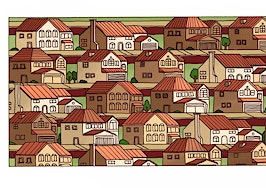Led by significant price hikes in Orlando, Las Vegas and Tucson, Arizona, the cost of renting a single-family home grew by 3 percent to an average of $1,412 a month in July, according to CoreLogic’s latest Single-Family Rent Index (SFRI).
Nationwide, median rent grew by 0.3 percentage points year-over-year, with “southern” enclaves, as CoreLogic characterizes cities in the southern half of the United States, experiencing the biggest rental hikes.
Single-family renters in Orlando shouldered the highest year-over-year increase at 6.4 percent, outpacing Las Vegas, where rent prices led the nation throughout the first half of 2018. Renters in Las Vegas experienced the second highest spike at 5.7 percent, followed by Tucson at 4.2 percent, according to the CoreLogic analysis, released Wednesday.
“Metro areas with limited new construction, low rental vacancies and strong local economies that attract new employees tend to have stronger rent growth,” wrote the authors of the new analysis. “Both Orlando and Las Vegas experienced high year-over-year rent growth, driven by employment growth of 4.3 percent and 3.9 percent year over year respectively.”

Courtesy of CoreLogic
Rent prices, which have been rising steadily since 2010, are likely to continue to grow given current market conditions of low inventory and high demand.
According to the CoreLogic analysis, the rent hikes in southern cities can be attributed, in part, to a range of hurricanes and other natural disasters that hit states like Texas in 2017.
“Single-family rents were quick to respond to the late-summer hurricanes in 2017 with increased rental demand showing up in higher rents in just one to two months after the disasters,” said Molly Boesel, CoreLogic’s principal economist. “Similar movements in rents could be seen in metro areas affected by Hurricane Florence in the following months.”

Courtesy of CoreLogic
While a rise in rents can be caused by strong local economies and job growth, cities where the economy struggled saw lower rental hikes, according to the CoreLogic analysis. In St. Louis, the city with the lowest employment growth, rent grew by only 1.8 percent.












